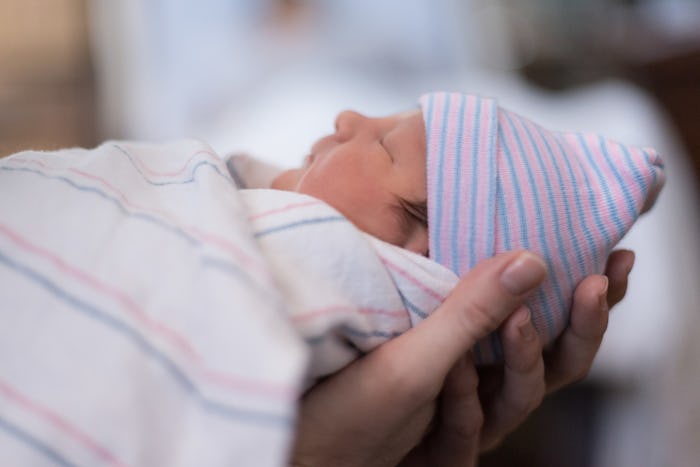Life
Many Babies Don’t Show Meningitis Symptoms, Study Says, So Here’s What Parents Should Know
Bacterial meningitis is a common disease among young babies, but it is not always so easy to detect. That's because many babies don't exhibit the common symptoms of meningitis when infected, according to a recent study. For this reason, The Meningitis Research Foundation is out to raise awareness of other ways in which the illness presents itself and help parents to remain informed about their children's wellbeing.
Only 50 percent of babies younger than 3 months old who have bacterial meningitis exhibit a fever, according to HuffPost UK. Additionally, other common symptoms such as coma, seizure, neck stiffness, and a bulging fontanelle — also referred to as their soft spot — are uncommon in babies of this age. With these young infants being at the highest risk of contracting meningitis, missed symptoms can be dangerous.
The study, funded by The Meningitis Research Foundation (MRF), involved 263 infants from across the U.K. and Ireland. Researchers found that fevers were only reported in 54 percent of cases. The numbers were even lower for the other common symptoms: with seizures in 28 percent, bulging fontanelle in 22 percent, coma in six percent, and neck stiffness in just three percent of infants, according to the MRF. Instead, these babies fed poorly, and were lethargic and irritable — symptoms that the researchers pointed out can be easily mistaken for mild illness.
The MRF is promoting awareness of other, less-well known signs and symptoms of meningitis to keep parents from assuming that the lack of a fever means that babies do not have the illness, and to keep doctors from misdiagnosing. The Independent reported that babies younger than 3 months old are 70 times more likely to contract meningitis than adults, making correct diagnosis crucial. Vinny Smith, chief executive at the MRF, said that it was a life or death issue, according to the Daily Mail UK:
Young babies are particularly vulnerable to bacterial meningitis. Meningitis and septicaemia [blood poisoning] are deadly diseases that strike without warning. Rapid diagnosis and treatment provides the best chance of survival.
Along with the study, Smith said that the the MRF and researchers have created a training package for doctors and other health care professionals to facilitate diagnosis and treatment, according to the Daily Mail UK. They also put together a helpful information sheet for parents, "so that they know not to rely on fever alone as the main symptom to look out for in babies."
Instead of just looking out for fevers, Meningitis Now recommends that parents with young babies also keep an eye out for vomiting, muscle pain, and cold hands and feet. Additionally, the NHS says the most common symptom is a rash that begins with small, red spots before spreading over the body and turning into red or purple blotches.
While the rash is easy to spot, Susette Worgan-Brown of Meningitis Now told HuffPost UK that parents shouldn't become too dependent on that one symptom for detecting the disease either:
Obviously the rash is a symptom of meningitis, but this doesn’t appear in all cases. And parents should not wait until the rash appears if they are concerned about their child’s health.. Meningitis and septicaemia [blood poisoning] often happen together. Be aware of all the signs and symptoms. Symptoms can appear in any order, some may not appear at all.
Bacterial meningitis symptoms in general can be difficult to spot in babies, according to the Centers for Disease Control, and early treatment with antibiotics is crucial. Parents who are concerned that their child may be infected with it should seek the advice of their pediatricians. Increased awareness of the signs and symptoms of the disease empower both parents and doctors to properly diagnose and treat meningitis in infants.
Check out Romper's new video series, Bearing The Motherload, where disagreeing parents from different sides of an issue sit down with a mediator and talk about how to support (and not judge) each other’s parenting perspectives. New episodes air Mondays on Facebook.
